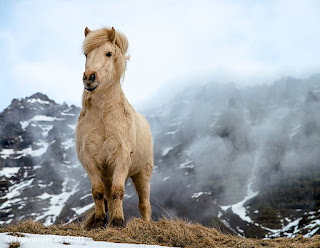In the winter I like to know that my horses are all tucked up in their stables, nice and warm. Basil and Chesney are always rugged in the winter and Fidget always had a thin outdoor rug for when it was cold and wet - Tommy is the same!
Do they need rugs though or could they keep themselves warm enough?
Horses lose body heat when it is transferred to the colder air around them (by radiation) , they also lose heat when their skin touches colder things like water, snow or mud (conduction). Finally, horses also lose heat through respiration and sweating!
How do horses keep themselves warm?
- Their winter coats are coarser than their summer coats and they also have a thin soft layer of hair underneath. These 2 layers trap air (which is warmed by their bodies) and create an insulating layer against the cold. The angle of the hairs (downwards) helps rain and snow to be deflected away before they get to the skin.
- These hairs can stand on end (like the hair on our arms) which will trap more air and increase the insulating layer.
- The skin has 2 layers, the top layer is made up of several waterproof layers, the second layer contains fat cells which provide insulation against the cold.
- The skin also produces oil which provides a protective barrier from the wet.
- When horses eat they generate heat, they are designed to continually graze. So make sure your horse has some hay available when there is no grass!
- The blood vessels in the skin will constrict allowing less blood to travel near to the surface which means less heat is lost from here (heat is lost from blood vessels).
- Horses can also restrict blood flow to their ears, legs and muzzle which will again reduce heat loss.
- Their lower legs have no muscles which means that there is less blood circulating there, so less heat to be lost from the blood vessels.
- Horses can also direct extra blood to their feet, tails and ears if they get cold by using a mechanism called the 'direct shunt'. This basically allows blood to flow into these areas via veins (rather than the usual capillaries which are smaller) until the area is warmed up when the shunt will close.
What do they do when they feel cold?
- If a horse is starting to feel cold their body will begin to burn extra calories - this will generate heat BUT will use any fat reserves and they will begin to lose weight. So having a bit of extra weight going in to winter is not necessarily a bad thing but if your horse does not have any extra weight then he will need to take in more calories (food) to maintain his condition.
- When a horse exercises heat is produced when the muscles burn energy. So a good run around and/or play will help to warm them up.
- Shivering also involves the muscles burning energy so produces heat, horses have large areas of muscle so shivering is very effective for them!
- Horses will stand with their bottoms to the cold wind, rain or snow and spread out the hairs on their docks. Their back and bottoms have thicker skin and hair so more insulation! Also, there are less blood vessels near the surface.
- The mane and forelock also offer protection to their heads and neck, their eyelashes protect the eyes.
- Horses will also stand closer together and even 'huddle' to conserve heat.
All of this means that our horses are actually better adapted for the cold than we think. Obviously some horses are better adapted than others. Cold blooded horses will cope better than hot blooded horses due to their genetics, their ancestors and the countries they originate from.
I only have to compare the coat that Basil grows to the coat that Tommy grows to know that Tommy is much better equipped to cope with the cold temperatures of winter.
Have you seen last week's video 'It's December!' on my new You Tube channel?
Horse Life and Love. Please check it out and SUBSCRIBE.
You can also follow me on Facebook and Instagram for updates on Chesney, Basil, Tommy and Daisy.
Until next time!
Jo






No comments:
Post a Comment